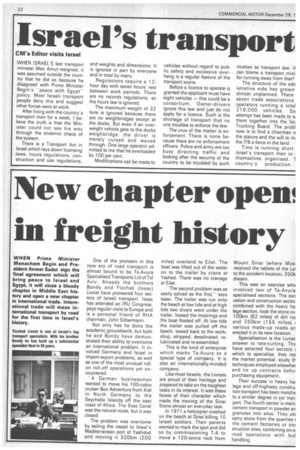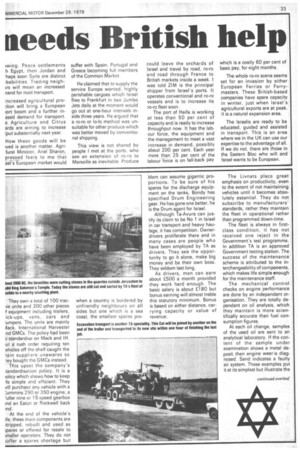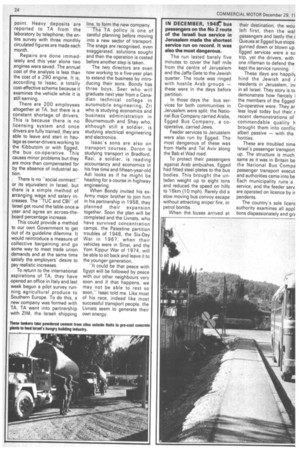New chapter open!
Page 24

Page 25

Page 26

If you've noticed an error in this article please click here to report it so we can fix it.
in freight history
WHEN Prime Minister Menachem Begin and President Anwar Sadat sign the final agreement which will bring peace to Israel and Egypt, it will close a bloody chapter in Middle East history and open a new chapter in international trade. International trade will mean international transport by road for the first time in Israel's history. One of the pioneers in this new era of road transport is almost bound to be Ta-Avura Specialised Transports Ltd of Tel Aviv. Already the brothers Bondy and Ytzchak (Isaac) Livnat have pioneered four sectors of Israeli transport. Isaac has attended an 1RU Congress, pays regular visits to Europe and is a personal friend of RHA chairman, John Silbermann.
Not only has he done the academic groundwork, but both he and Bondy have demonstrated their ability to overcome an international problem. It involved Germany and Israel in import-export problems, as well as one of the most unusual rollon roll-off operations yet encountered.
A German businessman wanted to move his 100-cabin cruiser Bon Adventura from Kiel in North Germany to the Seychelle Islands off the east coast of Africa. The Suez Canal was the natural route, but it was closed.
The problem was overcome by sailing the vessel to Israel's Mediterranean port of Yashdod and moving it 320km (200 miles) overland to Eilat. The boat was lifted out of the water on to the trailer by crane at Yashad. There was no cranage at Eilat.
"The second problem was as easily solved as the first," says Isaac. The trailer was run onto the beach at low tide and at high tide two divers went under the trailer, loosed the moorings and ,the boat floated off. At low tide the trailer was pulled off the beach, towed back to the workshop, stripped, desalinated, relubricated and re-assembled.
This is the kind of enterprise which marks Ta-Avura as a special type of company. It is also an internationally-minded company.
Like most Israelis, the Livnats are proud of their heritage and prepared to take on the toughest tasks in its interest. It was these facets of their character which made the moving of the Sinai Stone almost an everyday task.
In 1971 a helicopter crashed on the beach at Sinai killing 10 Israeli soldiers. Their parents wanted to mark the spot and did so by commissioning T-A to move a 120-tonne rock from Mount Sinai (where Mos received the tablets of the Lai to the accident location, 350k distant.
This was an exercise whii involved two of Ta-Avura specialised sections. The exc vation and construction sectio combined with the heavy ha lage section, took the stone ov 100km (62 miles) of dirt roz and 250km (155 miles) 1 various made-up roads an erected it in its new location.
Specialisation is the Livnat answer to rate-cutting. The have selected four sectors i which to specialise, they rea the market potential, study th techniques employed elsewhei and tie up contracts befor purchasing equipment.
Their success in heavy ha lage and off-highway constru tion transport has been matche to a similar degree in car tran port. The fourth sector is main cement transport in powder an granules into silos. They ale carry stone from the quarries I the cement factories or cor struction sites, combining on-o road operations with bul handling. They own a total of 100 tracve units and 200 other pieces f equipment including trailers, lick-ups, vans, cars and lumpers. The units are mainly Aack, International Harvester nd GMCs. The policy had been o standardise on Mack and IH iut a rush order requiring ten ehicles off the shelf caught the lain suppliers unawares so ley bought the GMCs instead.
This upset the company's tandardisation policy. It is a iolicy which shows how to keep ife simple and efficient. They vill purchase any vehicle with a :ummins 290 or 350 engine, a 'uller nine or 15-speed gearbox ind an Eaton or Rockwell back )nd.
At the end of the vehicle's ife, these main components are ;tripped, rebuilt and used as ;pares or offered for resale to ;mailer operators. They do not ;uffer a spares shortage but when a country is bordered by unfriendly neighbours on all sides but one which is a sea coast, the smallest spares pro blem can assume gigantic proportions. To be sure of his spares for the discharge equipment on the tanks, Bondy has specified Drum Engineering gear. He has gone one better, he is the Drum agent for Israel.
Although Ta-Avura can justify its claim to be No 1 in Israel in car transport and heavy haulage, it has competition. Ownerdrivers proliferate there and in many cases are people who have been employed by TA as drivers. They see the opportunity to go it alone, make big money and be their own boss. They seldom last.long.
As drivers, men can earn about £500 a month provided they work hard enough. The basic salary is about £180 but bonus earning will almost treble this statutory minimum. Bonus is based on either distance, carrying capacity or value of revenue. The Livnats place great emphasis on productivity, even to the extent of not maintaining vehicles until it becomes absolutely essential. They do not subscribe to manufacturers' standards, rather they maintain the fleet in operational rather than programmed down-time.
The fleet is always in firstclass condition, it has not received one reject in the Government's test programme. In addition TA is an approved Government testing station. The success of the maintenance scheme is attributed to the interchangeability of components, which makes life simple enough for the maintenance staff.
The mechanical control checks on engine performance are done by an independent organisation. They are totally dependant on oil analysis, which they maintain is more scientifically accurate than fuel consumption figures.
At each oil change, samples of the used oil are sent to an analytical laboratory. If the content of the sample under examination shows a metal deposit, then engine wear is diagnosed. Sand indicates a faulty air system. These examples put it at its simplest but illustrate the point. Heavy deposits are reported to TA from the laboratory by telephone; the entire survey with three monthly circulated figures are made each month.
Repairs are done immediately and this year alone two .engines were saved. The annual cost of the analysis is less than the cost of a 290 engine. It is, according to Isaac, a totally cost-effective scheme because it examines the vehicle while it is still earning.
There are 200 employees altogether at TA, but there is a constant shortage of drivers. This is because there is no licensing system and once drivers are fully trained, they are able to leave and start in haulage as owner-drivers working to the Kibbutzim or with Egged, the bus co-operative. This causes minor problems but they are more than compensated for by the absence of industrial action.
There is no "social contract" or its equivalent in Israel, but there is a simple method of arranging wage and salary increases. The "TUC and CBI" of Israel get round the table once a, year and agree an across-theboard percentage increase.
This could provide a method to our own Government to get out of its guideline dilemma. It would reintroduce a measure of collective bargaining and go some way to meet trade union demands and at the same time satisfy the employers' desire to pay realistic increases.
To return to the international aspirations of TA, they have opened an office in Italy and last week begun a pilot survey running agricultural produce to Southern Europe. To do this, a new company was formed with TA. TA went into partnership with ZIM, the Israeli shipping
line, to form the new company.
The TA policy is one of careful planning before moving into a new sector of transport. The snags are recognised, even exaggerated, solutions sought and then the operation is costed before another step is taken.
The two directors are even now working to a five-year plan to extend the business by introducing their sons. Bondy has three boys, Seer who will graduate next year from a Canadian technical college in automobile engineering, Zri who is studying economics and business administration in Bournemouth and Shay who, although still a soldier, is studying electrical engineering and electronics.
Isaac's sons are also on transport courses. Doron is studying transport in Bradford, Razi, a soldier, is reading accountancy and economics in his free time and fifteen-year-old Adi looks as if he might be heading for a course in highway engineering.
When Bondy invited his exArmy major brother to join him in his partnership in 1958, they planned their expansion together. Soon the plan will be completed and the Livnats, who have survived concentration camps, the Palestine partition troubles of 1948, the Six-Day War in 1967, when their vehicles were in Sinai, and the Yom Kippur War of 1974, will be able to sit back and leave it to the younger generation.
"It could be that peace with Egypt will be followed by peace with our other neighbours very soon and if that happens, we may not be able to rest so soon," Isaac told me. Like most of his race, indeed like most successful transport people, the Livnats seem to generate their own energy.




































































